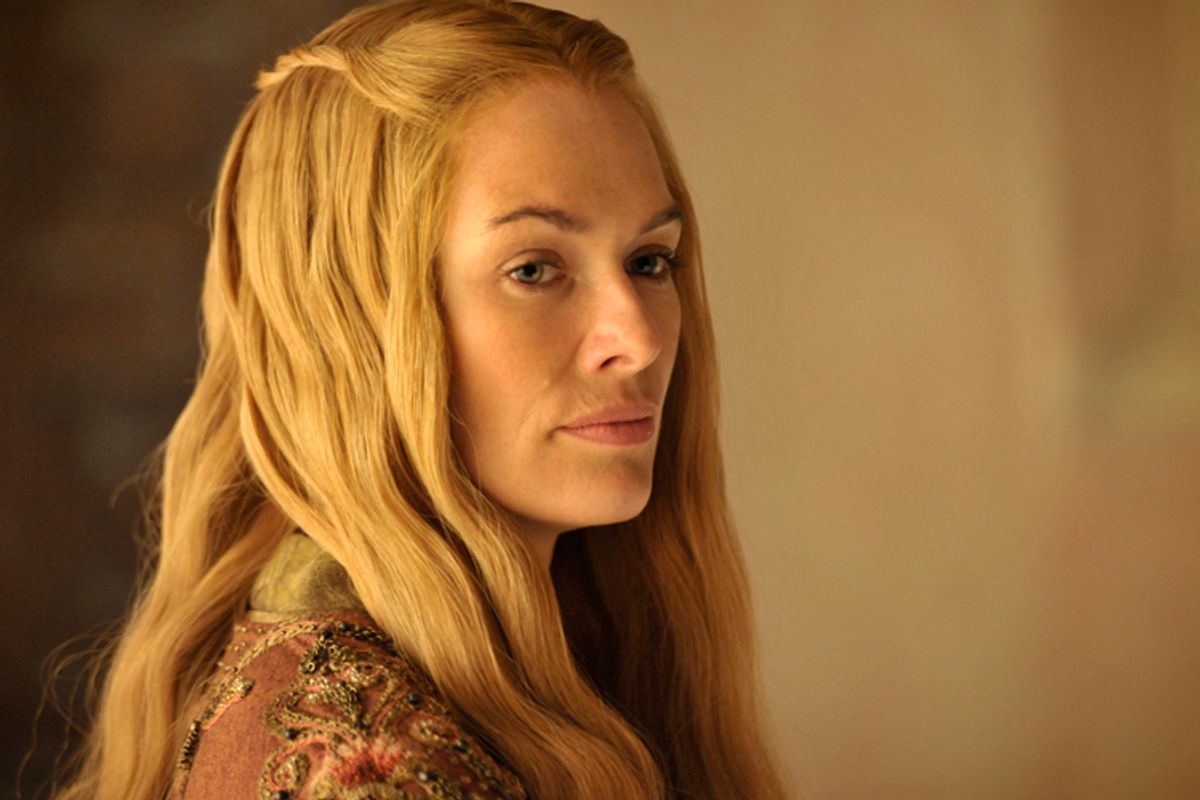NOTE: This piece is about last night's "Game of Thrones" episode and contains plot details, as well as details about how the plot differs in the book series.
So much of cable TV isn't just made by but about so-called "difficult men," with shows that plumb the complicated souls of powerful antiheroes. AMC's "Breaking Bad," generally regarded as among the best of modern prestige drama, was far more successful at showing us the inner life of Walter White than that of his wife Skyler, who largely existed to react to his ambitions. "Halt and Catch Fire," an attempt by AMC to create a new critical and commercial hit, treats women only as objects of fantasy or as obstacles to men getting what they want. And love or hate "House of Cards," it's hard to deny that it's Frank's show, not Claire's -- the newly-minted First Lady has mostly seen her goals subsumed to her husband's.
And so it is that, with each passing season, "Game of Thrones" comes to seem more and more important, as a series with the most fully realized female characters onscreen right now. The women of "Game of Thrones" are complicated and animated by passions entirely their own -- and never more so than last night.
The season finale began with, and happily soon abandoned, Jon Snow, the character who most closely resembles a classic hero in his demographic profile. He's good-looking, tormented, and the show's least interesting person by far; Snow's boring nature has come to feel almost subversive, as though the show were trying to make a statement by making Snow's half-sister, Arya, so much more exciting. But it's simpler than that: Snow is motivated by uncinematic virtues like duty, while Arya is motivated only by self-preservation.
The fact that Westeros is such a hard world for women has forged fantastic characters -- the show depicts a misogynistic universe, and treats as its consequence female rebellion. Arya, in the final moments of the season, set sail for Braavos and an uncertain future; Brienne of Tarth defeated the Hound in combat; Daenerys sacrificed her dragons in order to be a stronger leader; Cersei admitted to her love for Jaime.
Cersei's been a sticking point this season, and it was hard, watching her reunion with Jaime, not to think about the scene during which he'd sexually violated her. That scene, which differs meaningfully from its representation in the "A Song of Ice and Fire" books (where the liaison had been consensual), was a rare example of the show losing its balance, doing so much to depict the brutality and nastiness of the world that it ended up betraying Jaime and unnecessarily hurting Cersei. It would have been possible to carry across the idea that Cersei was heartbroken after the death of her son without adding in a terrible betrayal. And if the show had been seeking to convey the degree to which Cersei and Jaime cling to one another in a toxic bond -- well, that came through loud and clear last night.
That major misstep, though, can be understood as an attempt to give Cersei the sort of traumas that have helped to define each character, male and female. Daenerys has matured, after seasons of meandering, discomfort, and various betrayals, into a judicious leader able to quickly react to changing circumstances, while Arya and (unseen last night) Sansa have both become endlessly resourceful as orphans. It's not merely that the show presumes the inner lives of women are as interesting as those of men -- it's that the women have to fight even harder to be recognized within the world of the show, giving them by far the most interesting stories. (They're rather like "Mad Men"'s Joan and Peggy in this regard, sharpened by the fact that they perpetually need to justify their existence.) Stannis Baratheon and Daenerys, for instance, both want to rule Westeros, and one of them has never had to win over people who are convinced he is inherently unworthy because of gender. Which one would you rather watch?
There's been much talk, online, about the absence of Lady Stoneheart -- the reanimated Catelyn Stark who appears to claim vengeance the end of the book on which this season was based. There may well be pragmatic concerns; the actress who played Catelyn, for instance, had notionally left the show and may well have been filming the season of "24." But it doesn't feel, yet, like a crippling loss. We don't need a literally reanimated corpse to show us just how cruel to its characters "Game of Thrones" can be. Arya setting sail was the perfect ending for this season -- promising something fresher and more resourceful than the tired old mechanics of honor and vengeance. After all, the most interesting characters wouldn't, suddenly, to having hearts of stone, but would evolve, naturally, into something far more interesting.

Shares